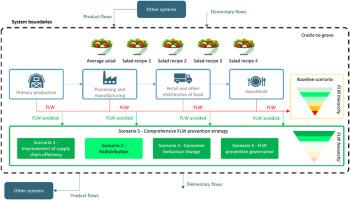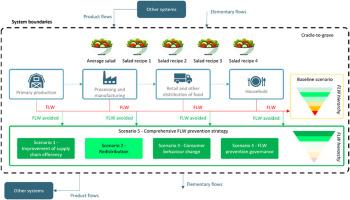食物损失和浪费预防行动的碳和水足迹:准备好的沙拉从摇篮到坟墓的生命周期评估
IF 10
1区 环境科学与生态学
Q1 ENGINEERING, ENVIRONMENTAL
引用次数: 0
摘要
粮食损失和浪费是可持续发展面临的重大挑战。预防自然灾害的行动正在增加,但在评估其实际净环境效益方面,特别是在产生时的预防方面,仍然存在重大差距。此外,数据透明度仍然是一个关键问题。本研究旨在评估在西班牙准备好的沙拉案例研究中实施的5组FLW预防行动所避免的环境影响。此外,还分析了4种不同的沙拉食谱,从而也考虑了成分组成对预防FLW行动有效性的影响。进行了从摇篮到坟墓的生命周期评估(LCA),以全面了解整个系统的实际影响。该方法包括识别和表征FLW产生点,从而能够更精确地估计FLW,从而通过预防措施减少FLW。结果表明,创新治理方案产生的积极影响最大,避免了9.81%的气候变化影响,减少了8.80%的水资源利用。动物性成分比例较高的沙拉减少的影响最大。这些发现突出了决策者有针对性地开展预防工作的领域。初级生产对环境的影响最大的是FLW。然而,从整体的角度来看,有效的预防应该集中在下游的发电点。总之,所提出的LCA方法准确地确定了最有希望的FLW预防机会,以改善食品的环境性能。数据透明度的提高提高了准确性,促进了LCA和FLW研究的开放性和问责性。本文章由计算机程序翻译,如有差异,请以英文原文为准。


Carbon and water footprint of food loss and waste prevention actions: Cradle-to-grave life cycle assessment of a prepared salad
Food loss and waste (FLW) represents a major challenge for sustainable development. FLW prevention actions are proliferating, but key gaps persist in assessing their actual net environmental benefits, particularly in prevention at the point of generation. Additionally, data transparency is still a key issue. This study aims to assess the environmental impacts avoided by 5 groups of FLW prevention actions implemented in a prepared salad case study in Spain. Additionally, 4 different salad recipes are analysed, so that the influence of ingredient composition on the effectiveness of FLW prevention actions is accounted for as well. A cradle-to-grave life cycle assessment (LCA) was conducted to have a holistic view of the real impacts across the entire system. The methodology involves an identification and characterisation of the points of FLW generation, enabling a more precise estimation of the FLW that can be reduced through prevention actions. Results indicate that innovative governance solutions yield the most positive impacts, avoiding climate change impacts by 9.8 and water use by 8.80 %. The salad with higher proportions of animal-based ingredients experienced the largest impact reductions. These findings highlight areas for targeted prevention efforts for decision makers. Primary production generated the most environmental impacts coming from FLW. However, the holistic perspective taken demonstrated that effective prevention should focus on downstream points of generation. In conclusion, the presented LCA approach accurately identifies the most promising FLW prevention opportunities to improve the environmental performance of food products. The enhanced data transparency improves accuracy and promotes openness and accountability in LCA and FLW research.
求助全文
通过发布文献求助,成功后即可免费获取论文全文。
去求助
来源期刊

Journal of Cleaner Production
环境科学-工程:环境
CiteScore
20.40
自引率
9.00%
发文量
4720
审稿时长
111 days
期刊介绍:
The Journal of Cleaner Production is an international, transdisciplinary journal that addresses and discusses theoretical and practical Cleaner Production, Environmental, and Sustainability issues. It aims to help societies become more sustainable by focusing on the concept of 'Cleaner Production', which aims at preventing waste production and increasing efficiencies in energy, water, resources, and human capital use. The journal serves as a platform for corporations, governments, education institutions, regions, and societies to engage in discussions and research related to Cleaner Production, environmental, and sustainability practices.
 求助内容:
求助内容: 应助结果提醒方式:
应助结果提醒方式:


